Key takeaways:
- Public speaking fears often arise from a fear of judgment, making vulnerability and potential mistakes daunting for many speakers.
- Communication frameworks provide structure and confidence, allowing for more engaging and interactive presentations.
- Preparation is vital to overcoming anxiety; practicing and familiarizing oneself with the material boosts confidence and transforms fear.
- Embracing authenticity and vulnerability fosters strong connections with the audience, turning speaking engagements into meaningful exchanges.
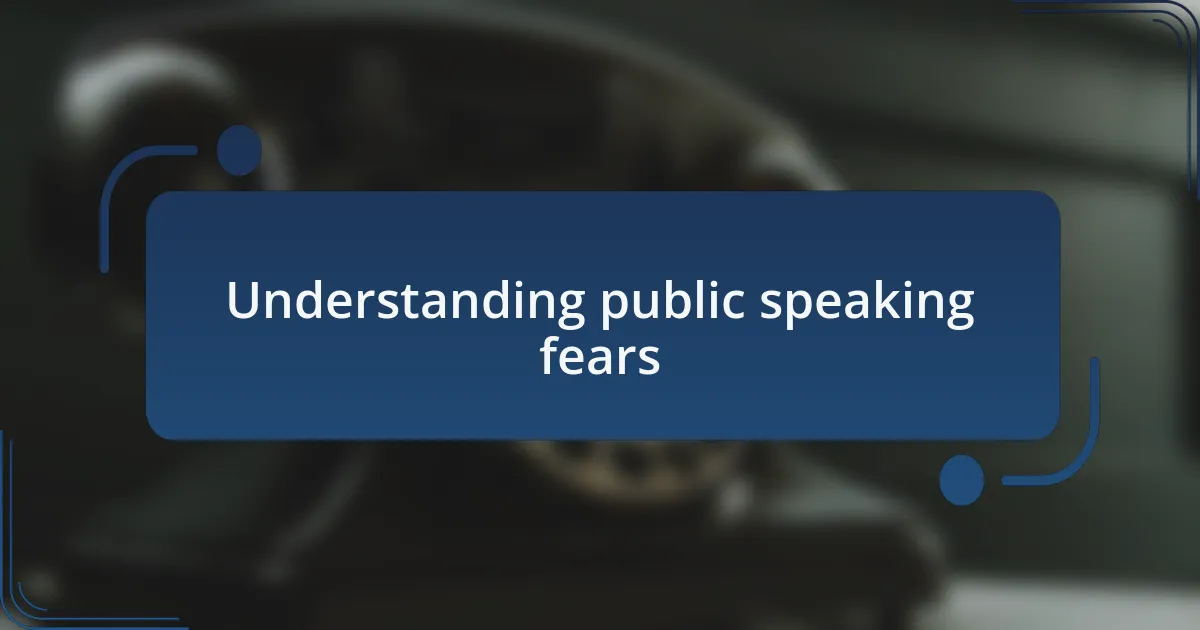
Understanding public speaking fears
Public speaking fears often stem from a deep-rooted fear of judgment. I remember standing in front of an audience, my heart racing as I scanned their faces for any hint of disapproval. Why do we care so much about what others think? It’s that primal instinct to belong and be accepted, which can sometimes paralyze us before we even begin.
Another layer of these fears is the fear of making mistakes. I’ve experienced that awful moment when I blanked out mid-sentence, and my mind went completely numb. It was as if the audience could hear my thoughts scrambling for the right words. This fear can be all-consuming, making even seasoned speakers feel vulnerable. Why do we let one misstep cloud our entire performance?
The fear of vulnerability plays a significant role, too. When I finally shared a personal story during a presentation, I felt naked and exposed. There was a moment of doubt—what if they didn’t connect with my experience? That feeling of being vulnerable can be daunting, but it’s often where the most authentic connections happen. Have you ever felt that way? It’s a delicate balance between sharing and guarding our true selves.
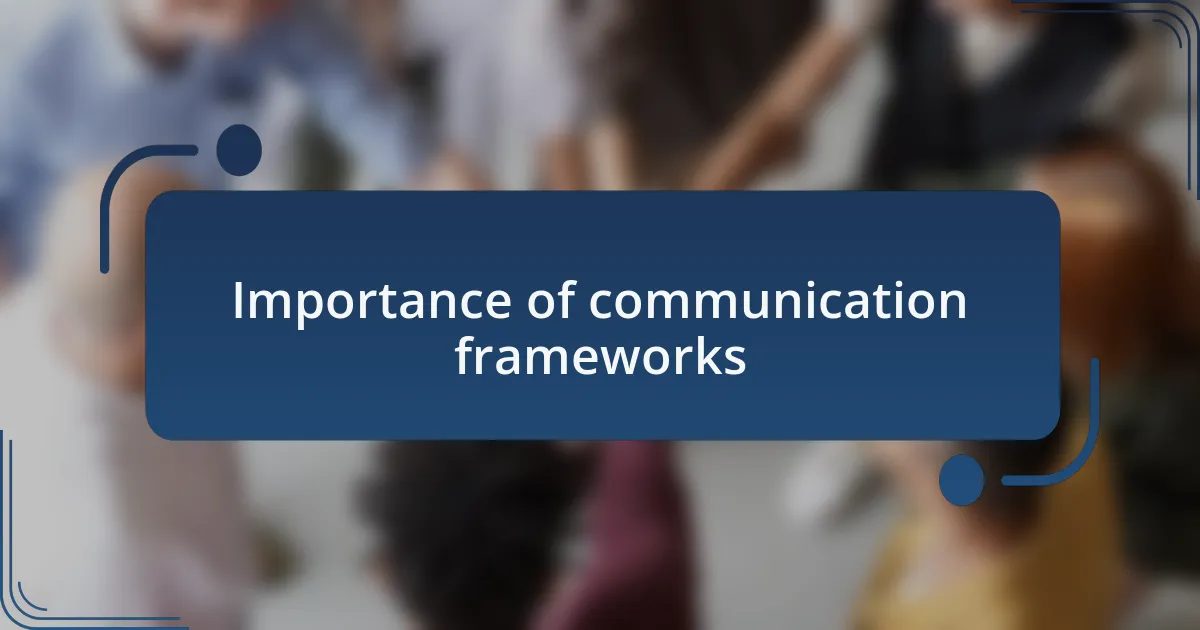
Importance of communication frameworks
Communication frameworks are vital because they provide structure and clarity, allowing individuals to convey their thoughts effectively. When I first learned about these frameworks, it was like turning on a light in a dark room. I realized that having a blueprint for communication helped me transition smoothly between points and kept my audience engaged.
Moreover, these frameworks can act as a safety net for those grappling with public speaking fears. I remember a time when I relied on a simple framework during a high-stakes presentation. It not only calmed my nerves but also helped me maintain focus, preventing my mind from spiraling into self-doubt. How reassuring it is to have a guiding plan in moments of anxiety!
Finally, communication frameworks foster a sense of connection and understanding among speakers and audiences. I’ve witnessed how frameworks encourage interaction, transforming a one-sided monologue into a dynamic conversation. Have you ever noticed how a clear structure invites more questions and feedback? That kind of engagement can turn a potentially fearful experience into a collaborative exchange.
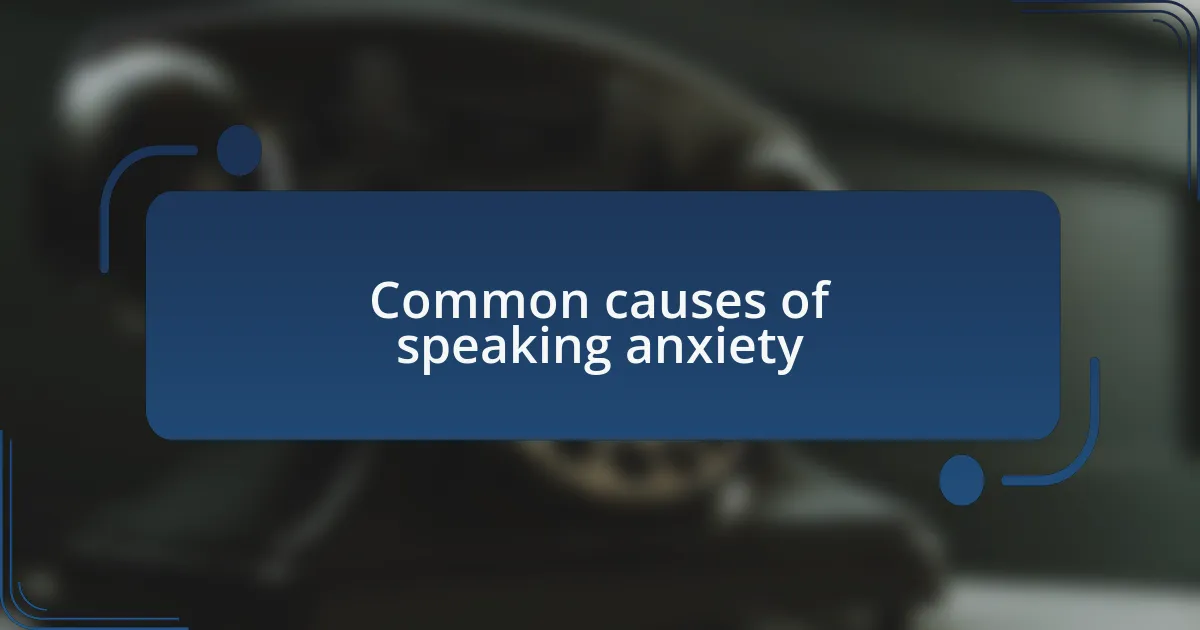
Common causes of speaking anxiety
When I reflect on my own experiences, I realize that fear of judgment is a major trigger for speaking anxiety. Standing in front of an audience, I can almost feel their eyes scrutinizing my every move. Has anyone else felt that overwhelming pressure to be perfect? That thought alone can send my heart racing, making it hard to focus on what I actually want to say.
Another common cause of anxiety stems from a lack of preparation. Early in my speaking journey, I remember diving into a presentation without adequately rehearsing. The uncertainty of stumbling over words or forgetting key points haunted me. It’s fascinating how the more I prepare, the more confidence I gain. Preparation transforms fear into excitement, turning what once felt daunting into a challenge I’m eager to face.
Lastly, the fear of making mistakes often looms large in the background of any speaking engagement. There was a time when I stumbled over a crucial statistic, and my face turned beet red from embarrassment. That moment taught me that mistakes are not fatal; they are simply part of the journey. Have you ever found it liberating to realize that even seasoned speakers falter? Embracing that notion can be incredibly freeing and can significantly reduce anxiety when speaking publicly.
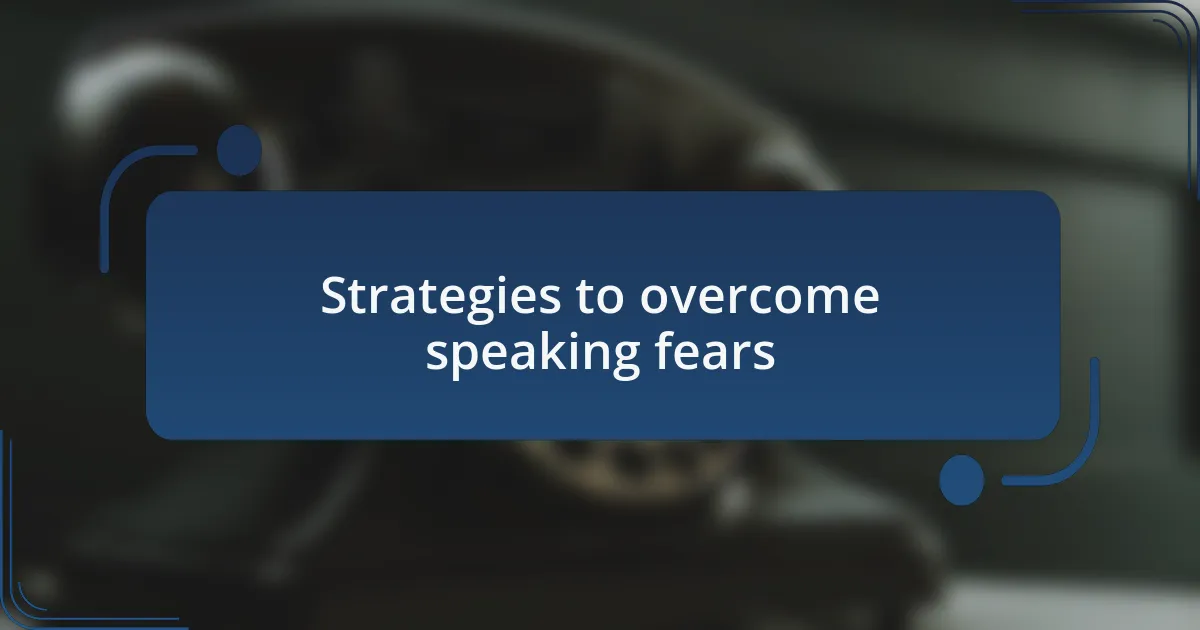
Strategies to overcome speaking fears
One of the most effective strategies I’ve found for overcoming speaking fears is visualization. Before stepping on stage, I close my eyes and imagine the audience reacting positively to my presentation. I can feel the energy shift as they nod, smile, and engage with my message. Have you ever tried picturing a successful outcome? This mental rehearsal not only calms my nerves but also helps me approach the speaking opportunity with a sense of anticipation rather than dread.
Another approach that has worked wonders for me is practicing mindfulness. When I feel that familiar knot in my stomach before speaking, I take a moment to breathe deeply and ground myself in the present moment. I focus on the sensory experiences around me, like the coolness of the air or the sounds of the audience settling in. This simple act of centering myself can shift my mindset from anxiety to presence. Have you ever noticed how a few deep breaths can change the way you view a challenge?
Lastly, embracing vulnerability can be a game changer. I vividly remember a time when I shared a personal story that made me feel exposed. Initially, I was terrified, but the audience’s empathetic response was overwhelming. It taught me that authenticity resonates deeply with people. Have you ever realized that sharing your true self can create a powerful connection? This realization not only diminishes my fear but also transforms my speaking engagements into meaningful exchanges rather than just performances.
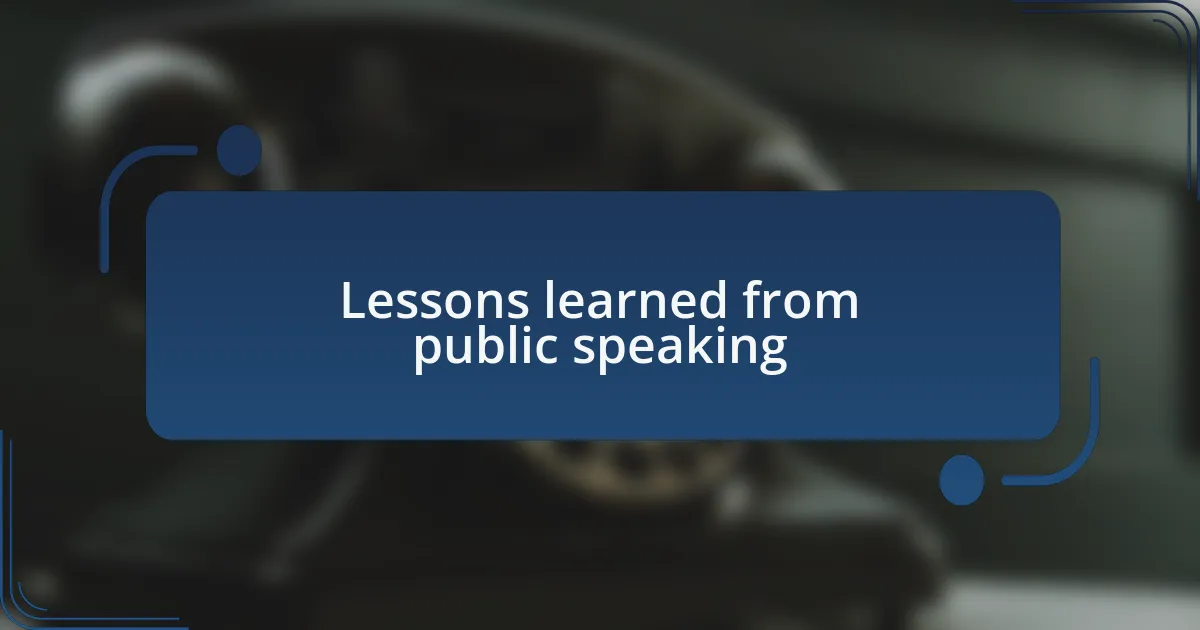
Lessons learned from public speaking
Public speaking has taught me that preparation is key. I once went into a presentation with minimal practice, thinking I could wing it. The result? A muddled delivery that left me frustrated. Now, I always allocate time for rehearsal, and it has significantly boosted my confidence. Have you ever faced a situation where a lack of preparation hindered your performance?
Another vital lesson I’ve learned is the importance of audience engagement. Early in my speaking journey, I would simply present information without considering how my audience was receiving it. One time, I noticed a few people yawning, which was a wake-up call. I began asking questions and incorporating interactive elements, transforming my talks into conversations instead of monologues. Have you noticed how an engaged audience can energize your presentation?
Lastly, I’ve discovered that every speaking opportunity is a chance to learn and grow. After one particularly challenging session, I felt defeated, but upon reflection, I identified areas for improvement. I embraced feedback from peers, which turned my fear of criticism into a constructive tool for growth. Isn’t it fascinating how each experience, even the tough ones, can lead us to greater expertise?
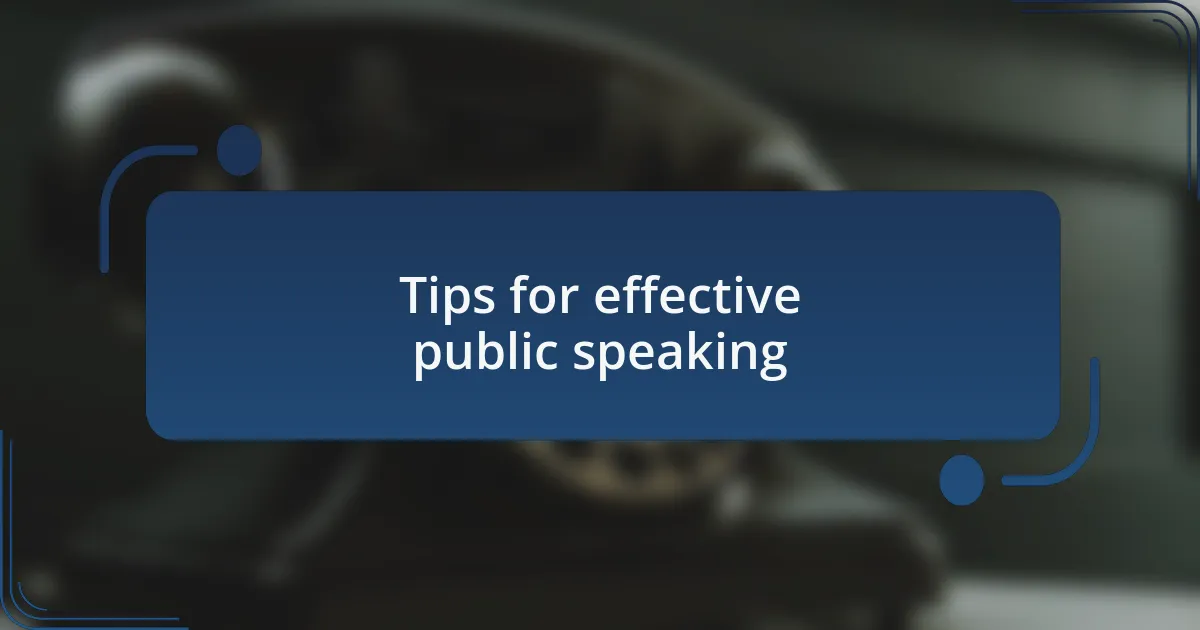
Tips for effective public speaking
One of the most effective tips I’ve embraced is to know your material inside out. During a speech on a topic I was passionate about, I underestimated the importance of familiarity. Mid-presentation, I stumbled over a crucial fact, which sent a wave of panic through me. Since then, I’ve made it a point to thoroughly research and rehearse until I feel completely confident. Ever found yourself so well-prepared that the words flow effortlessly?
Another strategy is to practice your delivery in front of a supportive audience. Early on, I rehearsed alone, which made me overly critical of myself. However, when a close friend listened to me, their encouragement transformed my nerves into excitement. I realized that getting comfortable with another person’s presence can be a game changer. How do you think feedback from someone you trust can improve your speaking skills?
Lastly, embracing your quirks and being authentic can significantly enhance your impact. Once, I nervously tripped over my words while trying to sound overly formal. Instead of feeling embarrassed, I shared a light-hearted joke about my mistake, instantly breaking the tension. I learned that vulnerability can resonate with audiences, fostering a connection. Have you ever noticed how being genuine can make your message much more relatable?